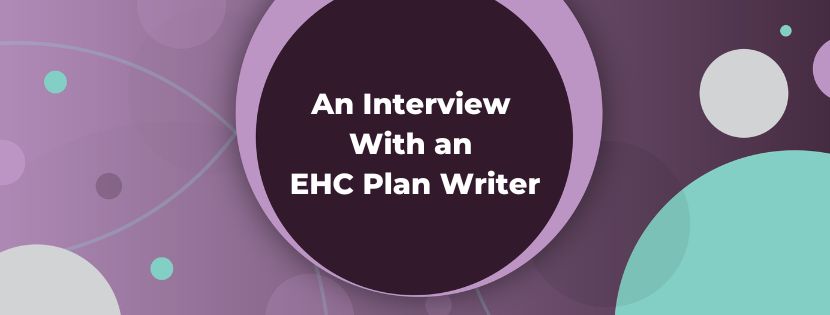
Unlocking the Lingo: A Glossary of the Most Commonly Used SEND Terms
22 Jan, 20241-2 minutes
In this blog, you will learn:
- A glossary of the most common SEND terms and acronyms.
- Where the latest SEND jobs are and how to apply for them.
Whether you work in the SEND industry, you’re interested in pursuing a career within special educational needs, or you’re on the lookout for your next SEND job, you might have noticed that there are a lot of terms associated with the industry.
The jargon surrounding the SEND industry can often be complex, with lots of similar looking acronyms to get your head around.
That’s why we’ve created a comprehensive glossary to explore the multitude of specialised terms and jargon bust some of the most common SEND terms!
AAC - Augmentative and Alternative Communication
Augmentative and Alternative Communication, known as AAC, refers to a diverse set of strategies, tools and techniques in place to support children and young people with communication impairments.
From aiding individuals with speech and language disorders to conditions such as autism, AAC uses techniques to replace spoken communication, such as signing, symbolisation and communication boards.
Additional Needs
In the context of education, the term additional needs, refers to the needs of individuals who require extra assistance due to factors such as a disability, learning difficulty or social and emotional challenge.
An educational institution must strive to create an inclusive learning environment for all students, whilst addressing any additional needs that a child or young person might have.
ADHD - Attention Deficit/Hyperactivity Disorder
Attention Deficit/Hyperactivity Disorder, shortened to ADHD, is a neurodevelopmental disorder found in children and adults.
ADHD can impact various aspects of an individual's daily functioning, from their ability to focus to controlling impulses and hyperactivity.
Symptoms of ADHD typically manifest in childhood but can persist into adolescence and adulthood.
Alternative Provision
Alternative provision is a term used to describe the educational arrangements in place for students who, for a number of reasons, are not able to attend mainstream school or learn in a traditional educational setting.
Such provisions are designed to cater to the needs of children and young people who may face challenges in mainstream education due to behavioural issues, medical conditions or special educational needs.
ASD - Autism Spectrum Disorder
Autism Spectrum Disorder, referred to as ASD, is a developmental disability that can cause people to experience challenges with social interaction, communication and restrictive or repetitive behaviours.
Caused by differences in the brain, individuals with ASD may require additional support with learning and experience difficulties with paying attention.
CAF - Common Assessment Framework
The Common Assessment Framework, also known as CAF, is a process used to identify a child’s unmet needs and then determine the measures required to support them.
The aim of a CAF is to improve the communication between multiple agencies, in order to streamline the process of supporting children who may be at risk.
The framework might involve school staff and social workers joining forces to improve a child’s school attendance.
CAMHS - Child and Adolescent Mental Health Services
CAMHS, standing for Child and Adolescent Mental Health Services, refers to a number of mental health services which operate to support children, adolescents and their families who are dealing with emotional, behavioural and mental health issues.
The aim of CAMHS is to provide early intervention, prevention and treatment for a variety of mental health conditions.
CLA - Children Looked After
The term Children Looked After (CLA) is a phrase used in the UK to refer to children who are under the care and responsibility of a local authority.
The term encompasses a range of situations where a child has been placed under the care of their local authority, either on a temporary or permanent basis. The term is also commonly worded as ‘Looked After Children’.
CL - Cognition and Learning
Cognition and Learning, or CL, refers to the challenges some individuals may experience when processing, understanding and recalling information.
Children and young people who experience cognition and learning difficulties, might struggle with their reading, writing, mathematics and problem-solving skills. Personalised teaching approaches and additional support are common methods for supporting children and young people identified as having difficulties with cognition and learning.
Cognitive ability
Cognitive ability is a term used by Psychologists to replace the word ‘intelligence’.
Cognitive ability refers to the mental skills and capabilities used by an individual to process information, learn, reason, problem-solve and make decisions.
Key components of cognitive ability include an individual's memory, attention, critical thinking and spatial reasoning.
CoP - Code of Practice
The SEND Code of Practice is a document providing statutory guidance regarding the duties, policies and procedures relating to special educational needs and disabilities.
The guide is designed for schools and local education authorities who must adhere to the code whilst caring for a child or young person with special educational needs or disabilities.
CP - Child Protection
Child protection (CP) is a term used to encompass the measures taken to ensure the safety, wellbeing and rights of children.
Child protection is a critical aspect of ensuring that children are raised in an environment that will support their physical, emotional and social development.
CP is a shared responsibility between families, communities and governments, who work together to ensure the safety of all children.
DDA - Disability Discrimination Act
The Disability Discrimination Act refers to legislation aimed to prevent discrimination against individuals with disabilities.
In the UK, the Disability Discrimination Act 1995, was replaced with the Equality Act 2010, which covers a broader range of characteristics and prohibits discrimination within employment, public functions and education.
Developmental delay
Developmental delay refers to a child not reaching the expected developmental milestones expected for their age.
Such milestones include physical, cognitive, social and emotional skills such as sitting, talking and walking.
Differentiated curriculum
A differentiated curriculum recognises and accommodates the diverse learning needs and abilities of children and young people within a classroom. This approach to teaching aims to tailor instruction and meet the unique needs of each student.
Differentiated curriculums offer a variety of resources and learning environments to ensure students are appropriately challenged and supported.
Dyslexia
Dyslexia is a neurological condition that can affect a person’s reading, writing and spelling capabilities. Key characteristics of dyslexia can also include difficulty with decoding words, delayed speech development and issues with phonological awareness.
It is important to understand that dyslexia has no bearing on a person’s intelligence. Many people with dyslexia have normal or above-average intelligence.
Dyspraxia
Dyspraxia is a neurological condition that can affect a person’s motor coordination and planning.
People who have dyspraxia often find performing coordinated movements a challenge, which can cause difficulty with daily living and academic performance.
Dyspraxia is a lifelong condition affecting people of all ages.
EHC - Education, Health and Care Assessment
An Education, Health and Care Assessment is a process existing in the UK which determines the special educational needs of a child or young person.
An EHC identifies the support that will be required to meet an individual's needs, with the aim of helping them reach their full potential.
EHCP - Education, Health and Care Plan
An EHCP, or Education, Health and Care Plan, is a legal document which outlines the support and services that may be required by a child or young person who has special educational needs.
A collaborative document, the EHCP involves parents, caregivers, educational professionals, health professionals and local authorities.
EHC Plan Writer
An EHC Plan Writer is responsible for drafting and writing an EHCP document.
Their role can include gathering information, assessing the needs of children and young people and articulating the required support and provisions in a comprehensive manner.
An EHC Plan Writer is a rewarding job role which requires a stand out CV.
EP - Educational Psychologist
An Educational Psychologist is a professional who applies psychological principles to address issues affecting a person’s learning, development and education.
Typically working with children and young people, Educational Psychologists aim to enhance the learning experiences and support the overall wellbeing of those they assist.
An EP’s responsibilities include assessment and diagnosis and intervention and support.
EWO - Education Welfare Officer
An Education Welfare Officer works within the education system to support the wellbeing, attendance and engagement of children and young people.
First and foremost, an Education Welfare Officer will ensure that students are attending school regularly and that any issues impacting their attendance are dealt with appropriately.
An EWO frequently collaborates with Teachers, Children's Social Workers and healthcare professionals to achieve a positive outcome for students.
Expressive language
Expressive language refers to a child or young person’s ability to communicate their thoughts and feelings through words, gestures, writing and other forms of expression.
The key components of expressive language include vocabulary, grammar, syntax, semantics, pragmatics and fluency.
EY - Early Years
Early years typically refers to the stage of a child’s life from birth to the age of around five years old.
These formative years play a critical part in a child’s development and are categorised by rapid physical, social, cognitive and emotional growth.
Early Years education includes programs and settings that cater to the developmental needs of children.
GLD - Global Learning Difficulties
If a person receives a global learning disability diagnosis, this means they have met three key criteria.
The criteria for a global learning difficulty includes, a significant cognitive impairment, a significant impairment in skills needed for daily life and that the onset of disability began before adulthood and has a lasting effect on development.
HI - Hearing Impairment
A hearing impairment (HI) refers to the reduced ability to hear sounds to a varying degree that some individuals can experience.
Ranging from mild to profound, hearing impairments can affect either one or both ears.
A hearing impairment can affect a person’s daily life by making it difficult to understand speech, especially in a noisy environment.
IEP - Individual Education Plan
The term Individual Education Plan (IEP) refers to a personalised document developed for students with special educational needs.
The IEP outlines specific goals tailored to the child or young person’s individual needs and the strategies that will be put in place to help them.
The primary focus of an IEP is to ensure that students with special needs receive the educational support they require to help them succeed academically.
An Individualised Education Plan is determined by the school whereas an EHCP is determined by law.
IPSEA - Independent and Parental Special Education Advice service
The Independent and Parental Special Education Advice service is a charitable organisation that provides independent legal advice and support to parents and carers of children with special educational needs and disabilities, at no cost.
The aim of IPSEA is to equip parents and caregivers with the knowledge and understanding to advocate for their child’s educational rights.
LA - Local Authority
A local authority, otherwise known as ‘the council’, is a government body at local level, responsible for the administration and provision of different public services within a particular geographical location.
Local authorities are able to decide on local issues, manage services within the area and allocate resources within their geographical boundary.
LAC - Looked After Children
‘Looked after children’ refers to children and young people who are in the care of a local authority.
They may have been placed within this care by a court order or as a result of being voluntarily accommodated, because their parents or caregiver is unable to provide suitable care.
The care of looked after children is often governed by legal regulations and frameworks. The term is also commonly phrased ‘Children Looked After’.
LDA - Learning Difficulty Assessments
A Learning Difficulty Assessment is a comprehensive evaluation, conducted with the aim of identifying the specific learning difficulties that a person might have.
The evaluation will assess a person’s cognitive strengths and weaknesses, along with their academic and functional skills.
A Learning Difficulty Assessment should result in a detailed profile of a person’s learning style in order to provide them with a successful support strategy.
Learning difficulties
Learning difficulties refer to the challenges an individual might face, usually in the context of education.
Such difficulties can manifest in the acquiring, processing or expressing of information and can affect a person’s ability to learn and progress academically when it comes to acquiring skills in reading, writing and mathematics.
Mainstream school
A mainstream school is an educational institution that provides education to a diverse student body, regardless of whether they have special educational needs or not. In a mainstream school, students with and without learning difficulties and disabilities are taught together in an inclusive learning environment.
In some cases however, students with significant disabilities or complex needs may require additional support from a specialised unit within the school.
Makaton
Makaton, a communication system, combines signs, symbols and speech to support the communication, understanding and language development of individuals who struggle with their communication skills.
The use of Makaton is an effective measure for helping individuals with conditions such as autism, by assisting them when expressing their thoughts and feelings.
MLD - Moderate Learning Difficulties
Moderate Learning Difficulties (MLD) is an educational term, used to describe a level of learning difficulty that is more significant than what would usually be considered for a child of a particular age.
Children and young people with moderate learning difficulties might require additional support throughout their education. The term is a broad label and specific challenges can vary greatly from person to person.
Modified curriculum
A modified curriculum involves making adjustments to the standard educational curriculum to meet the individual needs of students, usually those with special educational needs or disabilities.
Any modifications made are done so to ensure the curriculum is more accessible for students who require additional support with their learning.
Non-verbal skills
Non-verbal skills refer to the communication of information without the use of spoken or written words.
Such skills entail a range of behaviours and cues, used to convey messages and emotions through non-verbal methods.
The key components of non-verbal skills include body language, facial expressions, eye contact and touch.
OFSTED - Office for Standards in Education, Children’s Services and Skills
The Office for Standards in Education, Children’s Services and Skills, otherwise known as OFSTED, is a non-ministerial government department within the UK, responsible for inspecting and regulating a variety of educational settings such as schools, colleges and nurseries.
The main responsibility of OFSTED is to ensure the quality of education provided to young people is of a high standard.
OT - Occupational Therapist
An Occupational Therapist (OT), is a healthcare professional who specialises in occupational therapy and occupational science.
An Occupational Therapist is responsible for helping people who may have suffered from a health condition that now affects their ability to carry out routine daily tasks.
PD - Physical Disability
A physical disability is a condition that limits a person’s mobility, stamina, physical function and dexterity. People who have a physical disability may experience challenges in performing everyday activities such as walking and maintaining balance.
Individuals can be born with a physical disability due to a genetic factor, however, some people may acquire a physical disability as a result of an injury or medical condition.
PEP - Personal Education Plan
A Personal Education Plan is a document commonly used within primary and secondary education, designed to support the educational development of an individual student.
A PEP will usually be put in place for students who face specific challenges within their education and therefore require additional support.
PMLD - Profound and Multiple Learning Difficulties
Profound and Multiple Learning Difficulties, referred to as PMLD, is a term used to describe the challenges that some individuals experience in various aspects of learning, communication and daily life.
PMLD refers to a complex combination of severe intellectual disabilities, along with additional physical and sensory impairments.
SaLT - Speech and Language Therapy
Speech and Language Therapy (SaLT), is a healthcare profession which focuses on the assessment, diagnosis and treatment of communication and swallowing disorders.
Speech and Language Therapists are responsible for helping individuals of all ages who may struggle with their speech, language, voice and other oral motor skills.
Speech and language therapy also involves developing personalised treatment plans tailored to the unique requirements of each client.
SEMH - Social, Emotional and Mental Health
Social, Emotional and Mental Health, referred to as SEMH, is used within the field of education and refers to the broad range of social, emotional and mental health difficulties that might impact a student’s ability to engage in their education and social interactions.
SEN - Special Educational Needs
The term Special Educational Needs (SEN) refers to students who require additional support within their education as a result of learning difficulties.
Support for students with SEN, should create an inclusive educational experience, promoting the idea that all students have the right to access and benefit from education, regardless of any abilities or disabilities.
SEN TA - Special Educational Needs Teaching Assistant
A Special Educational Needs Teaching Assistant, is an educational professional who works alongside a Special Educational Needs Teacher, to provide support to children and young people with special educational needs.
A Special Educational Needs Teaching Assistant might be responsible for delivering specialised, individual support for students who require additional assistance in the classroom.
SENCO/SENDCO - Special Educational Needs (and disabilities) Coordinator
The terms ‘SENCO’ and ‘SENDCO’ are frequently interchanged within an educational context to refer to the same role.
A Special Educational Needs (and Disabilities) Coordinator, is a role within the education system which primarily focuses on coordinating and overseeing the special educational needs provision with educational settings.
A SENCO or SENDCO is responsible for ensuring that students with special educational needs can access the support necessary for them to benefit from their education.
SEND - Special Educational Needs and Disabilities
Much like the term ‘SEN’, Special Educational Needs and Disabilities (SEND) is a term used to refer to individuals who have learning difficulties or disabilities that result in them requiring additional support within their education. The inclusion of ‘disabilities’ in the term SEND reflects a broader perspective.
Speech, Language and Communication Needs (SLCN) is a broad term used to refer to a variety of difficulties and disorders related to speech, language and communication.
Common components of SLCN include, articulation disorders, voice disorders and early language delay.
SLD - Severe Learning Difficulties
Severe Learning Difficulties, referred to as SLD, is a term used to describe the significant intellectual or cognitive impairments that some learners face.
A severe learning difficulty is usually diagnosed at birth or in the first few years of a child’s lifetime and can cause developmental delays, meaning children require extra support with their education.
SM - Selective Mutism
Selective Mutism, shortened to SM, is a disorder resulting in a child being unable to speak in some social situations. An anxiety disorder, selective mutism can affect children within the school setting and if left with no support in place, can be a challenge throughout adulthood too.
Whilst a child might struggle to speak in some social settings, they may display no signs of such difficulties in other situations.
SPD - Sensory Processing Disorder
Sensory Processing Disorder (SPD) is a condition that can affect how sensory information, or stimuli, is processed within the brain.
People with SPD are often overly sensitive to stimuli that other people are not and this can affect any number of their senses, including, sight, smell, taste, touch and what they hear.
SPD is usually recognised during the first few years of a childhood.
Special school
A special school is an educational institution which specifically caters to students with special educational needs or disabilities.
Such schools are designed to provide tailored support and a specialised curriculum, able to meet the unique needs of children and young people who may experience challenges in a mainstream school.
SpLD - Specific Learning Difficulties
Specific Learning Difficulties is a broad term used to refer to a variety of challenges that can affect a person’s ability to acquire, store and recall information in an effective manner. This can include dyslexia, dyspraxia and dyscalculia.
Quite often, individuals with specific learning difficulties have average or even above average intelligence but can struggle with specific areas of their learning development.
VI - Visually Impaired
VI, referring to a person who is visually impaired, describes a degree of vision loss that can’t be fully resolved with glasses, contact lenses or any other common corrective measure.
The term ‘visually impaired’ is frequently used as an umbrella term and covers a range of visual disabilities. Whilst visually impaired people may find certain aspects of daily life more challenging than non visually impaired people, many people with a visual impairment can participate fully in education and employment.
If you’re an employer looking for ways to make your workplace more accessible for visually impaired individuals, check out how you can incorporate braille into your day to day practices.
SEND jobs
Searching for a rewarding SEND job? Look no further! We work with a number of SEND schools and local authorities across the UK to provide the best interim, temporary, contract and temp-perm jobs. Simply take a look at the roles we have available now or upload your CV today!
Who is Spencer Clarke Group?
As an award winning recruitment agency, we’re continuously evolving to deliver the best possible service to candidates and clients. From our office culture to the way we conduct business within a variety of specialisms across the UK, we believe in the importance of going above and beyond.
We operate in two sectors:
In eleven specialisms:
Healthcare, Social Care & Nursing
Corporate Functions & Business Support



